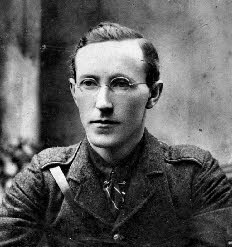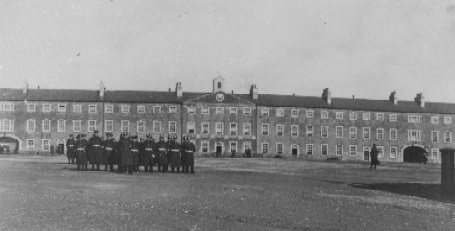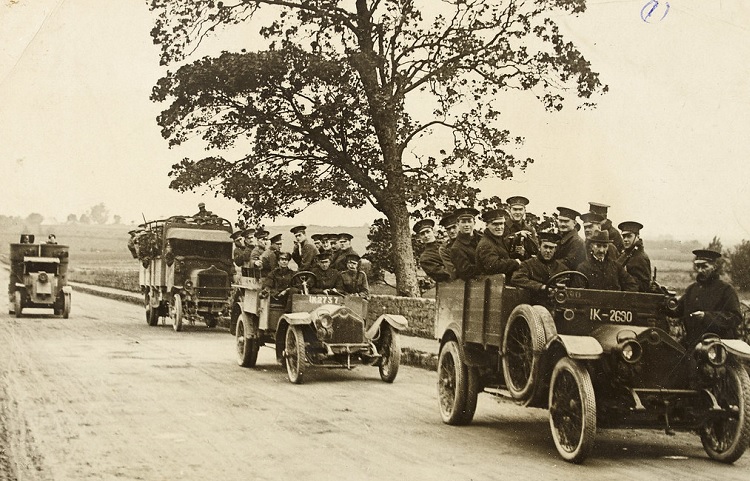‘Where Did General Lucas Go?’ | The Kidnapping of General Cuthbert Lucas
‘Where Did General Lucas Go?’ became a popular song around North Cork 100 years ago. It concerned the kidnapping of a British General by the Irish Republican Army and was often sung by children to taunt British soldiers on the streets. The song stemmed from the real life kidnapping of one of the most senior British officers in Ireland at the time, Brigadier General Cuthbert Henry Tindall Lucas.
General Lucas was a World War One veteran who saw action from Gallipoli to the Somme. After the war General Lucas thought more peaceful days might see him into his retirement. In 1919, he was made Commander of the 16th Infantry Brigade in Ireland. But little did he know, as a physical push for Irish freedom swept the land, he was to become a target of those orchestrating this war.

On June 26th 1920 General Lucas, who was based in Fermoy barracks, found himself captured by the IRA when he left his guard down while fishing on the banks of the Blackwater at Kilbarry. On that warm summers day, he was accompanied on his fishing trip by Colonel Danford of the Royal Artillery and Colonel Tyrrell of the Royal Engineers along with his personal servant who stayed in the fishing lodge to prepare lunch while the three fishermen set off. Meanwhile two young IRA scouts had spotted the men fishing on the banks of the river and rushed to tell the officer commanding the Cork No. 2 Brigade, Liam Lynch. A plan of kidnap was then set in motion.
Lynch led the party of kidnappers in two cars towards the fishing spot. Among the party were George Power, Paddy Clancy and Sean Moylan who has been credited with authorship of the song ‘Where Did General Lucas Go?’
Lynch and his men crept into the fishing lodge and took the servant hostage. They waited for the three British officers to return but got tired of waiting and let the servant go back to the barracks with a letter Lynch had written informing them of the impending kidnapping and what demands had to be met for their release.
Lynch and his men went off to the river bank and before long came upon the army officers who were taken by surprise. They gave no resistance and were put into two separate cars with their captors.
Moylan and Power were in the first car with Tyrell while Lynch and Clancy were behind in the second car carrying Lucas and Danford. Unbeknownst to Lynch and Clancy, their two prisoners were quietly conversing in Arabic, a language they had acquired during their WWI days, and they were hatching a plan of escape.
Danford lunged forward to take the wheel but in the chaos that followed the car headed straight into a ditch and hand to hand fighting ensued. Lynch and Lucas were busy belting fists at each other in the back seat of the crashed Ford while Danford was getting the better of Clancy on the roadside. The Lynch and Lucas fisticuffs spilled out from the car and onto the dusty road before the British general eventually surrendered to his Irish counterpart, but the Clancy and Danford fight was still continuing further on up the road.

Danford, realising General Lucas had lost his fight with Lynch, slipped from Clancy’s grasp and made a run for it up the road. Shots rang out and Danford fell with a bullet lodged in his shoulder. The car that had been travelling in front turned back to the scene of the crash and the order was given by Lynch to let Tyrell remain with the wounded Danford while the rest of them headed in the direction of Lombardstown.
Over the following four weeks General Lucas would be moved from a series of safe-houses covering regions in North Cork, Limerick, Tipperary and Clare. Troops flooded into those areas in the hope of rescuing General Lucas but to no avail. Such fruitless results caused troops in Fermoy to sack the town in retaliation. Meanwhile the song regarding General Lucas set to the tune of ‘The Blarney Roses’ was gaining popularity and was heard in public houses and on street corners, much to the bitterness of British troops who were known to dish out beatings to anyone heard singing it.
While the authorities were exhausting themselves in tracking down General Lucas, he was enjoying the hospitality of his captors. In his captivity, he played tennis and handball and would often teach cricket in return for Irish language lessons from his captors. One night while in a safe house in east Clare, General Lucas was brought out on the River Shannon for a spot of salmon poaching. At first he protested against it for fear the water bailiff might catch them but, his worries were put to rest when he discovered the IRA boatman bringing them out on the Shannon was the chief bailiff and salmon was successfully caught there that night.

It was while at a safe house under the command of Michael Brennan O/C of the East Clare IRA that Lucas made his escape on July 30th. Brennan grew financially tired of having to buy the English general a bottle of whiskey everyday out of his own pocket and preferred to attend to more pressing matters such as arms raids and ambushes and this resulted in the guard on General Lucas being scaled back. It was 1 o’clock in the morning when General Lucas climbed out a window in a house he was kept in at Herbertstown and in stockend feet ran to the nearest RIC barracks through a torrential downpour.
General Lucas reached Pallas Green village RIC barracks shortly before dawn and had a bath and change of clothes. He wrapped the clothes he had been wearing in a parcel and asked for it to be posted to an address in Cork city. The parcel reached its destination a week later with a note attached inside: ‘To the Sinn Feiners, or to the IRA, with compliments of General Lucas.’
He was put on a military mail lorry headed for Fermoy. As the lorry was nearing Oola in Co. Tipperary it was ambushed by IRA volunteers and 30 minutes of a firefight followed. The IRA retreated and then General Lucas who survived the ambush, continued on his way.
When General Lucas returned to Fermoy he bucked the trend of pouring scorn on the IRA and declared he had been treated like ‘a gentleman by gentlemen’. When he learned of the sacking of the town by his own troops General Lucas was not impressed by what he termed ‘an over zealous display of loyalty.’
General Lucas would retire to Henfordshire England in 1932 and died there in April 1958. His kidnapping during such a tense time in the war for national freedom proved to be a moral boost for the IRA and the lighthearted song which arose from the incident gave those living under imperial oppression something to sing about.
Where Did General Lucas Go?
Twas over in Rathcormac near the town of sweet Fermoy
They captured General Lucas and away with him did fly
They said you are our prisoner and this you have to know
You can’t do greenwoods dirty work where the Blarney roses grow.
Chorus:
Can anybody tell me where did General Lucas go?
He may be down in Mitchelstown or over in Mallow
He’s somewhere in the county Cork but this I want to know
Can anybody tell me where did General Lucas go?
‘Twas on a Sunday morning out a fishing he did go
And when he had his fishing done he was caught by you know who
They said you’ll have to come with us or down you will go
For that’s the way we’ll treat you where the blarney roses grow.
There’s good men down in Galway and the same in county Clare
But the likes of these young Cork men you won’t find anywhere
They treated me so kindly if they only let me go
I’d promise to stop reprisals where the blarney roses grow.
Now to conclude and finish I hope it won’t be long
Till we see old Ireland free and the RIC men gone
And when they free our prisoners and tell them they may go
We’ll do the same for Lucas where the Blarney roses grow
